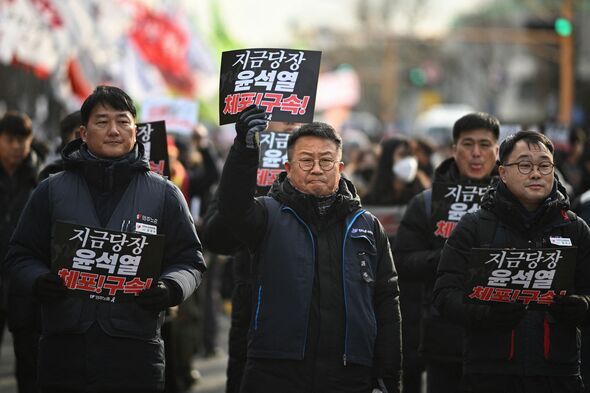South Korean investigators have withdrawn from the official residence of impeached President Yoon Suk Yeol after a tense six-hour standoff, during which Yoon defied their efforts to detain him.
The confrontation marks the latest flashpoint in a political crisis that has paralysed the nation. Two heads of state have been impeached in less than a month.
The country’s anti-corruption agency said its investigators were forced to leave after repeatedly clashing with Yoon’s presidential security service, which refused entry. The agency expressed “serious regret” over Yoon’s refusal to comply with the legal process, calling his actions obstructive and dangerous.
The National Police Agency has launched an investigation into senior members of Yoon’s security team, accusing them of obstructing official duties. The presidential security service’s chief and deputy chief have been summoned for questioning.
Yoon, a former prosecutor, has refused multiple requests for questioning. His last public appearance was on 12 December, when he delivered a defiant televised address. He vowed to resist efforts to remove him, calling the impeachment process unjust.
The crisis erupted after Yoon declared martial law on December 3, deploying troops to surround the National Assembly in response to parliamentary roadblocks to his policies. The opposition-dominated parliament swiftly overturned the declaration and impeached Yoon on 14 December, accusing him of rebellion. Anti-corruption authorities and public prosecutors launched separate investigations into his actions.
A court in Seoul issued a detention warrant for Yoon earlier this week, but enforcing it has proved difficult while he remains in his official residence. His lawyers argue the warrant cannot be executed on-site due to laws protecting areas linked to military secrets. They also claim the agency lacks authority to pursue rebellion charges and has no legal right to involve police in detaining Yoon.
The warrant remains valid for one week, but investigators have not confirmed whether they will attempt another arrest. If detained, Yoon must appear in court for a formal arrest order or be released within 48 hours.
The liberal Democratic Party criticised the failed attempt, with floor leader Park Chan-dae urging investigators to try again. In contrast, Kwon Young-se, leader of Yoon’s conservative People Power Party, condemned the operation as “unjust” and “unnecessary,” asserting there was no risk of Yoon fleeing or destroying evidence.
The residence was surrounded by police and pro-Yoon protesters waving South Korean and American flags in sub-zero temperatures, vowing to defend the embattled president. Despite the tense atmosphere, there were no reports of major clashes.
Investigators and police initially breached the military perimeter around Yoon’s residence but were stopped by the Presidential Security Service.
Scuffles broke out, with lawyers representing Yoon later accusing the investigators of recklessness and “outrageous disregard for the law.” Rival protesters have taken to the streets of the capital.
The standoff has intensified pressure on Deputy Prime Minister Choi Sang-mok, the country’s acting leader, to intervene. Democratic lawmakers have called on Choi to order the security service to allow investigators access, accusing him of neglecting his responsibility to uphold the law and resolve the crisis.
The fallout from Yoon’s martial law declaration has already led to the arrests of his defence minister, police chief, and several military commanders. With Yoon’s presidential powers suspended since his impeachment, his fate now rests with the Constitutional Court.
The court has begun deliberations on whether to uphold the impeachment, which would permanently remove Yoon from office, or to reinstate him. At least six of the nine justices must vote to confirm his removal.
The National Assembly has added to the uncertainty by impeaching acting President Han Duck-soo for failing to appoint three Constitutional Court justices ahead of Yoon’s trial.
With no clear resolution in sight, South Korea remains mired in political chaos.
Facing growing pressure, the new acting president, Choi, appointed two new justices on Tuesday, which could increase the chances of the court upholding Yoon’s impeachment.
